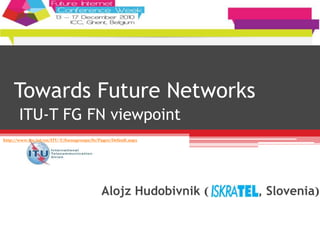
Alojz Hudobivnik - Towards Future Networks ITU-T FG FN viewpoint
- 1. Towards Future Networks ITU-T FG FN viewpoint Alojz Hudobivnik ( , Slovenia) http://www.itu.int/en/ITU-T/focusgroups/fn/Pages/Default.aspx
- 2. Future networks • ITU-T start pre-standardization activities with identification of FNs input requirements (FG FN) : ▫ new social requirements (e.g., environment), ▫ new application areas (e.g., IoT, cloud, smart grid), ▫ new implementation technologies are found! These will introduce the development of new network architectures; we call this Future Networks • ITU is not R&D body. Direction is find by surveying already existing activities (Asia, EU, USA) • Produced document Future Networks: Objectives and Design Goals (8th FG FN meeting Ljubljana) is first “guidance”. • Appropriate timeframe for prototyping and phased deployment of FNs is 2015 - 2020 • Next phase is also task of researcher to find the best answers on requirements. 2 NGNs Cleaner slate design approach 2015~2020 미래Futuristic Services Future Networks
- 3. Definition • Future Networks (FNs): ▫ A future network is a network which is able to provide revolutionary services, capabilities, and facilities that are hard to provide using existing network technologies. A future network is either: a) new component network or an enhancement to an existing one; or b) federation of new component networks or federation of new and existing component networks. FN - Vision document • fundamental issues that are not paid enough attention in designing today’s networks as ‘objectives’, • capabilities that should be supported by future networks as ‘design goals’, • ideas and research topics of future networks that are important and may be relevant to future ITU-T standardization as ‘promising technologies’. Network for/of Individual Network for/of Society Network for/on Earth 4
- 4. Four Objectives • Environment awareness ▫ FNs should be environmental friendly. • Service awareness ▫ FNs should provide services that are customized with the appropriate functions to meet the needs of applications and users. • Data awareness ▫ FNs should have architecture that is optimized to handling enormous amount of data in a distributed environment. • Social-economic awareness ▫ FNs should have social-economic incentives to reduce barriers to entry for the various participants of telecommunication sector. 5 FUTURE NETORKS ENVIRONMENT AWARENESS SERVICE AWARENESS DATA AWARENESS SOCIAL-ECONOMIC AWARENESS
- 5. 12 - Design Goals 1. FNs should accommodate a wide variety of traffic and support diversified services (Service Diversity) 2. FNs should have flexibility to support and sustain new services derived from future user demands (Functional Flexibility) 3. FNs should support virtualization so that a single resource can be used concurrently by multiple virtual resources. FNs should support isolation and abstraction (Virtualization of resources) 4. FNs should have mechanisms for retrieving data in a timely manner regardless of its location (Data Access) 5. FNs should have device, system, and network level technologies to improve power efficiency and to satisfy customer’s requests with minimum traffic (Energy Consumption) 6. FNs should facilitate and accelerate provision of convergent facilities in differing areas such as towns or the 6
- 6. 12 - Design Goals (Cont.) 7. FNs should be designed to provide sustainable competition environment to various participants in ecosystem of ICT by providing proper economic incentives (Economic Incentives) 8. FNs should be able to operate, maintain and provision efficiently the increasing number of services and entities (Network Management) 9. FNs should be designed and implemented to provide mobility that facilitates high levels of reliability, availability and quality of service in an environment where a huge number of nodes can dynamically move across the heterogeneous networks (Mobility) 10. FNs should provide sufficient performance by optimizing capacity of network equipments based on service requirement and user demand (Optimization) 11. FNs should provide a new identification structure that can effectively support mobility and data access in a scalable manner (Identification) 12. FNs should support extremely high-reliability services (Reliability and Security) 7
- 7. 8.1 Service Diversity 8.2 Functional Flexibility 8.3 Virtuallization of resourc. 8.4 Data Access 8.5 Energy Consumption 8.6 Service Universalization 8.7 Economic Incentives 8.8 Network Management 8.9 Mobility 8.10 Optimization 8.11 Identification 8 ENVIRONMENT AWARENESS SERVICE AWARENESS DATA AWARENESS SOCIAL-ECONOMIC AWARENESS Objectives vs. Design Goals
- 8. Technologies for achieving the design goals • Network Virtualization (Virtualization of Resources) Enables creation of logically isolated network partitions over shared physical network infrastructures so that multiple heterogeneous virtual networks can simultaneously coexist over the shared infrastructures; it allows the aggregation of multiple resources and makes the aggregated resources appear as a single resource • Data/Content-oriented Networking (Data Access) • Energy-saving of Networks (Energy Consumption) Forward traffic with less power Control device/system operation for traffic dynamics Satisfy customer requests with minimum traffic • In-system Network Management (Network Management) • Distributed Mobile Networking (Mobility) • Network Optimization (Optimization) Device / System / Network level optimization (Path optimization, Network topology optimization, Accommodation point optimization) 9
- 9. Key Features of Future Networks 10
- 10. 11 Conclusion To design FN, wider collaboration than traditional ICT framework is necessary. • Today’s promising areas are all interdisciplinary ones between ICT and other industries Cloud: computer, smart grid: power, IoT: health, vehicle, etc. • ICT has become an infrastructure of every industry, so we need to learn their needs to design future networks • We can’t design smart grid ready network without understanding power industry’s requirements
- 11. Thank you! Questions? alojz.hudobivnik @ iskratel.si http://www.itu.int/en/ITU-T/focusgroups/fn/Pages/Default.aspx